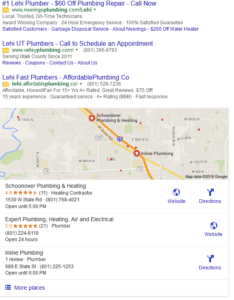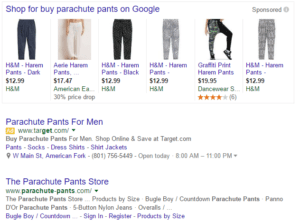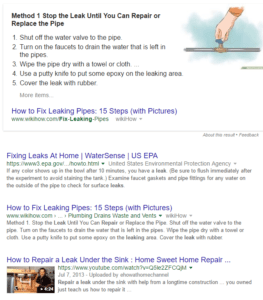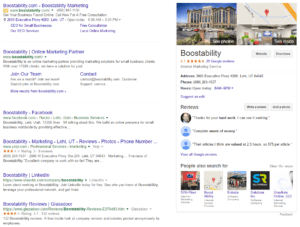How to Know You Are Choosing the Right Keywords

The success of your SEO campaign all starts with one decision—choosing the right keywords.
When making this delicate decision, you have to balance several factors, including: competition, search volume, and business growth.
On the one hand, you don’t want to target a keyword that is so competitive you’ll never rank for it. On the other hand, it does little good to rank for a keyword that doesn’t bring visitors to your website. In the end, keyword selection should help your business grow.
Instead of discussing specific tools, or even a specific process to follow when selecting keywords, let’s focus on selecting the right kind of keywords for your business.
What Types of Keywords Are There?
Google classifies keywords into three main categories: “do,” “know,” and “go.” Most of the time, a website will also fit into one of these categories. Google wants to match the type of website with the same type of keyword.
“Do”
Users will search for a “do” keyword when they want to complete an action. Such searches are usually transactional in nature. Examples of “do” keywords include “download Yoast plugin,” “buy Justin Bieber’s Purpose CD,” and “plumber Lehi Utah.”
Here’s what typical search results might look like for the “do” keyword “plumber Lehi Utah.” You can tell that this is a local keyword as it specifies a location and the SERP includes a Google Maps result. The page contains four ads at the top and three ads on the bottom.
Searchers in this situation aren’t interested in how to find a good plumber, what a plumber does, or even how much one costs. They are looking to use the service of a plumber. All the results lead the searcher to call and pay for a plumber service.

This next page shows results for a typical national “do” keyword, like “buy parachute pants.” The results are, again, catered towards someone buying the product rather than someone researching the product. You’ll notice that the search results consist of ads with images at the top and, again, three ads at the bottom. Google has provided results to facilitate the “do” nature of the search.

“Know”
“Know” keywords ask for information. Searchers want to know more about or research a certain topic.
This example, using the keyword “how to fix a leak,” shows how a “know” keyword search might look.

Google has provided a Knowledge Graph at the top in hopes of answering your question without you needing to leave the page. You’ll also notice that no ads are present in the search. Google does not think you want to buy something; it understands that you want to learn something.
“Go”
Below is an example of the results for a “go” keyword: “Boostability.” With “go” keywords, users know exactly where they want to go, but they might not know the URL or exact domain. The searcher has a specific purpose and is usually looking for a specific brand.

You’ll notice the search includes sitelinks (including links within the website), a business profile, and other resources that talk about Boostability.
What Type of Website Do You Have?
Without going too much into specifics, we have seen that Google provides significantly different results according to the type of keyword. The results not only appear in different layout, Google also provides different kinds of websites depending on the user’s query.
What kind of website do you have? When people visit your website, are they looking to do, know, or go?
Because Google is in the business of providing the best results, it is difficult for a “do” website to show up in a “know” search. Therefore, you need to know which kind of website you have to choose keywords of the appropriate type.
If you are reading this article, you most likely have a “do” website. Most small business owners use SEO to provide a service or sell a product. They want their website to to enable users to book a service or make a sale. You might be tempted to target a “know” keyword because of its high search volume. However, because your website is most likely a “do” website, you are less likely to rank for a “know” keyword.
Performance of “Know” Keywords vs. “Go” Keywords vs. “Do” Keywords
Let’s use an HVAC service to demonstrate why, as a small business owner, you would want to target a “do” keyword, even if it has a lower search volume.
“Know” keyword: HVAC system cost
This keyword, with its variations, receives thousands of searches a month. However, as you have already seen, the searchers are just looking to research and gather information.
You don’t want to try to compete for such a competitive keyword, especially as Google is less likely to show your website for a “know” keyword. Plus, searchers using this keyword are still in the investigation stage and not ready to make a purchase.
“Go” keyword: Eagar Heating and Cooling
In this case, the searchers already know the company they are looking for. It wouldn’t make sense for a different HVAC company to try to rank for this keyword, and Google is unlikely to let it happen.
If someone is looking for your business using its name, let’s hope they can find it. To improve your chances, optimize for your “go” keyword. Include variations of your business name in the content of your website and create a Google My Business account.
“Do” keyword: Lehi HVAC company
In this case, users are looking for an HVAC company in their location—they are very close to the point of purchase. This kind of keyword most effectively balances the aforementioned factors of competition, search volume, and business growth. A “do” keyword is the kind of keyword you can afford, rank for, and generate business from.
Picking the Right Keywords
Generally, the more specific the keyword, the better it is for SEO.
However, you need to make sure that the specificity in the keyword denotes the correct buyer intent. For example, you are more likely to rank for a “do” keyword, like “buy ergonomic keyboard,” and that keyword would be more beneficial—as long as you sell ergonomic keyboards.
Specificity even matters for local keywords. It is tempting to target a bigger city and offer your service there. But, unless your service is very specific faces little competition, you should target your own city first—where you’ll find a decent amount of need for your service and not quite as much competition.
In the end, the best way to get the most bang for your buck while still receiving traffic is to target relevant and specific “do” keywords. The more specific (including the service and location) the keyword, the more likely you are to convert users (assuming, of course, people search for the term).
Targeting the correct kind of keyword is important, especially when your marketing budget is thin. Don’t get caught up in keywords with large amounts of traffic. Target “do” keywords that are relevant to your business. You’ll be more likely to have a successful SEO campaign and see your business grow.
Remember, choosing keywords is just a small fraction of SEO. To learn more about best practices, check out the resources in our SEO Basic Training.
This post was originally published in March 2017. It was last updated in January 2018.
